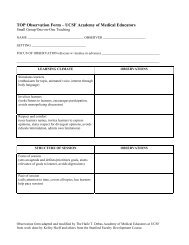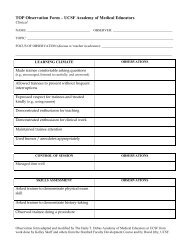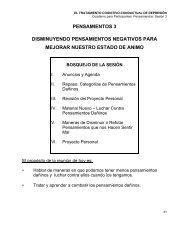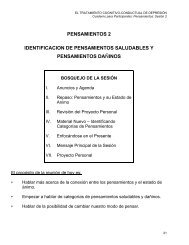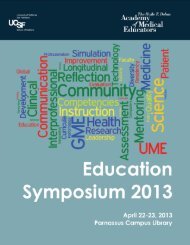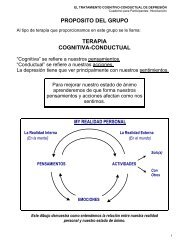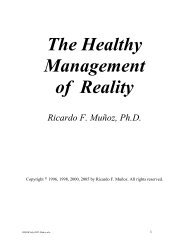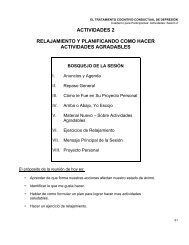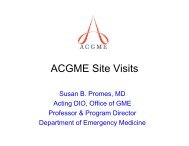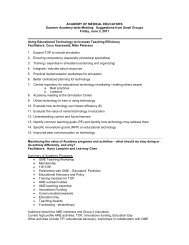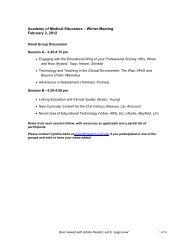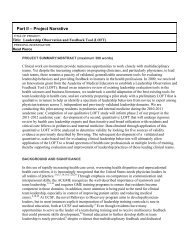2011 - UCSF School of Medicine - University of California, San ...
2011 - UCSF School of Medicine - University of California, San ...
2011 - UCSF School of Medicine - University of California, San ...
You also want an ePaper? Increase the reach of your titles
YUMPU automatically turns print PDFs into web optimized ePapers that Google loves.
<strong>UCSF</strong> Education Day <strong>2011</strong>preclerkship curriculum. However, administrativeresource-intensivity and uneven facilitator quality impactthe overall effectiveness <strong>of</strong> the modality. Given theincorporation <strong>of</strong> ACGME competencies into UME, thereis a need for early, structured practice in the domains <strong>of</strong>Interpersonal & Communication Skills, Practice-BasedLearning and Pr<strong>of</strong>essionalism.Methods: We developed 3 peer-facilitated (PF) basicscience small group sessions. Content learning isfaculty-supported by electronic and in-person “roving” Q-and-A, and multiple choice questions with instantfeedback. An accompanying self-facilitation curriculumconsists <strong>of</strong> an introductory large group presentation,incorporating audience participation, and a selffacilitateddebriefing after the first group. These sessionswere designed to explicitly address non-medicalknowledge learning by encouraging analysis <strong>of</strong> groupprocess and personal goal-setting.Evaluation Plan: To address the efficacy <strong>of</strong> the PFgroups for medical knowledge acquisition and forpractice <strong>of</strong> specific skills in other competency domains,we have collected student responses to quantitative andopen-ended questions. We have also collected objectiveperformance data from course examination questions.This data will be discussed and compared to thatcollected from more traditional small groups.Dissemination: Curriculum details and preliminaryevaluation data have been shared with curriculumoversight committees, and implementation in othercourses has been discussed. We will considersubmission to MedEdPORTAL and outside conferencesor journals once program evaluation is complete.Reflective critique: Based on pilot-year feedback, thegroups have been modified with increased contentcomplexity, additional multiple-choice questions, and theimproved use <strong>of</strong> technology and the new Teaching andLearning Center for faculty “check-ins” with groups.Future evaluation and implementation will also beinformed by outcomes from implementation <strong>of</strong> Team-Based Learning in the Essential Core.Preparing for Teaching Health CenterResidency Programs: Migrant and FarmWorker 4th Year Transition ElectiveAdriana Padilla, MD, <strong>UCSF</strong> Fresno Family and Community<strong>Medicine</strong>, apadilla@fresno.ucsf.eduAreas abstract covers: UMEDomain(s) addressed: Curricular Innovation, PrimaryCare, ReflectionPurpose: The Migrant and Farm worker elective engagesparticipants in a pathway highlighting primary health care incommunity health centers while learning about systemsbased practice. Such pathways will be critical to transition4th year students into teaching health centers.Background: Academic <strong>Medicine</strong>’s November 2010 journalhighlights the challenge <strong>of</strong> “Taking back Year 4.”1 Wallingand Merando further suggest that goals for the fourth yearshould be clarified.2 The Affordable Care Act will promoteteaching health centers (THC) which are expected todevelop in the Central Valley. This elective was designed t<strong>of</strong>acilitate a student’s transition to a rural THC and its uniquesystems based practice to encourage advance practiceskills.Methods: The elective includes clinical care responsibilities3 days a week and 2 days <strong>of</strong> field work activitieshighlighting systems based practice themes to allowdemonstration <strong>of</strong> an awareness <strong>of</strong> and responsiveness tothe larger context and system <strong>of</strong> health care. Fieldworkactivities include orientation to reflective learning and allowfor reflective analysis <strong>of</strong> student learning goals.Evaluation Plan: Participants are evaluated utilizing<strong>UCSF</strong>’s standard clinical evaluation form. Four reflectivesummaries are required from fieldwork learning goals.Qualitative methods will be used to explore the range <strong>of</strong>participant learning themes. Themes will be analyzed toenhance future participant learning and facultydevelopment.Dissemination: Presentations at departmental researchmeetings are planned. Critical will be presentations toTHC’s as they develop. Submission to family medicinejournals and meetings will occur.Reflective critique: Review by a THC was helpful indesigning the elective. Student participant evaluations havepromoted modification. Qualitative analysis will occur withFresno’s family medicine research team.References:1. Stevens C. Commentary: Taking back Year 4: A call to action.AcadMed. 2010;85:1663-1664.2 Walling A, Merando A. The fourthyear <strong>of</strong> medical education: A literature review. AcadMed.2010;85:1698-1704.<strong>University</strong> <strong>of</strong> <strong>California</strong>, <strong>San</strong> Francisco • <strong>School</strong> <strong>of</strong> <strong>Medicine</strong> 21



